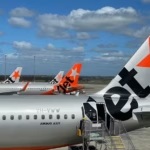Lufthansa is set to become the first international aviation group to introduce a carbon-neutral airfare.
The project was launched this week and will be available to passengers travelling with flights from Denmark, Sweden and Norway. Known as the ‘Green Fare,’ it will be an additional option alongside standard fares.
Lufthansa’s Executive Board’s push for ‘Green Fare’
Christina Foerster, member of the Lufthansa Group’s Executive Board, thinks the fare option is promising for Lufthansa’s sustainability practices.
“We want to make CO2-neutral flying a matter of course in the future. To this end, we already offer our guests the most comprehensive range of services and are consistently expanding this further. As of now, we are offering a dedicated ‘green fare’ for the first time, which already includes the complete offsetting of the flight’s CO2 emissions through sustainable aviation fuel and certified climate protection projects, already embedded in the price.”
SAF agreement signed between Lufthansa and Shell Group

Additionally, Lufthansa has also signed a Memorandum of Understanding (MoU), with Shell International Petroleum Group to further explore the supply of sustainable aviation fuels (SAFs) around the world.
The contract states the supply of 1.8 million metric tons of SAF starting in 2024 over a term of seven years. which would make it one of the most significant commercial collaborations for SAF in the aviation sector.
Jan Toschka, President of Shell Aviation, has expressed her support for the collaboration in a statement given.
“I am very happy to see the relationship between Shell and the Lufthansa Group moving towards reaching our respective sustainability goals. It is encouraging to see large flagship carriers coming to us to discuss SAF supply deals, knowing there will be a lot of things to be defined and determined at a later stage, including established price markers.”
The introduction of the Green Fare option may be costly as a result of the reduction of carbon dioxide emissions due to limited SAF production. However, it is expected for airfare prices to be more affordable in the near future as we use more SAFs.
In a race for carbon neutrality, airlines are testing different options to try and eliminate the use of fossil fuels by 2050. Airlines such as Air Lingus and Qantas are following Lufthansa’s steps, slowly making arrangements with companies that produce more SAFs in the effort to become carbon neutral.
Do you think the use of SAFs will result in mass airfare surge? Let us know in the comments below!









